Our modern-day lives often seem ruled by screens; smartphones, laptops, smartwatches and so on. Most of us use these to communicate, resorting to abbreviations or acronyms to make life easier and to save precious seconds. Using slang has always been a way of looking ‘cool’ (or whatever the current term might be) and this is always evolving as new words are added and new acronyms invented. It can be confusing at times, especially if you are older or unacquainted with a lot of these terms and their meanings. What can help us is when these terms enter the mainstream, extending beyond the limits of being used purely by the young and the stylish.
One such acronym – that has become very popular in the last few years – is FOMO, appearing frequently in social media posts, countless Internet memes, or texts passing between friends and family. Not only that, it has been recognized as something real, an actual condition as well as just a feeling that a lot of us experience from time to time. And it isn’t just health professionals who have realized this; certain industries have caught on and are using it as a means of increasing sales. But what is it all about?

We’re going to take a look, starting at the beginning.
Before FOMO, there was FOBO
The author and venture capitalist Patrick McGinnis is often cited as the first person to coin the term FOMO when he referred to the phenomenon in an article written in 2004 for Harvard Business School’s magazine called The Harbus. In this article, he linked it to another condition he named FOBO, which he believed at the time to be a bigger issue.
However, back in 1996, the marketing strategist Dr. Dan Herman had already identified the phenomenon, though it took until 2000 to complete his research and publish a paper on the subject, printed in The Journal of Brand Management.
As some people still may not have any idea what either FOMO or FOBO mean, they are as follows:
- FOMO meaning = Fear Of Missing Out.
- FOBO meaning = Fear Of a Better Option.
It is probably easy to see why the first one is more popular, as it captures a wider range of scenarios and can easily be applied to our modern, fast-paced lifestyles. The second term is more associated with having second thoughts once you have made a decision, perhaps when purchasing an item or choosing from a menu in a restaurant.
The other FOBO – Fear of being offline
This is a relatively new term that has come about after the rapid onslaught of technology, phones, tablets and consoles. My son Harry is forever playing games online fearing that he will miss the next Fortnite update, the latest skin or perhaps even just not accruing rank/score fast enough!
It is not just games it is also the use of his mobile, my daughters are the same they cannot take there eyes off it (I have to admit im just as bad).
If your children are heading the way mine are maybe try using one of these time restricting apps so that they have a limit on there daily use.

What is the fear of missing out?
You might recognize the feeling. You receive an invitation to a party, but you really shouldn’t go as you’ve already made plans. You start to feel anxious, weighing up in your mind whether you should cancel the plans and go anyway. But what if it’s a great party? Everyone else will be there, having fun, except me. It isn’t simply a case of making a decision, it really does make you agonize over which way to go.
The rise of the use of FOMO can be directly linked to the increased use of social networking sites. As more and more users post photos of events or describe what a great time they’re having, others look on and wonder if they are missing out on those experiences. It leads to feelings of envy and general dissatisfaction with life, and, in some serious cases, depression.
In fact, studies show that FOMO, especially when linked to social media use, can be detrimental to our mental health in a number of ways. Feelings of loneliness, low self-esteem, inferiority, and social anxiety can all be symptoms of FOMO.
Any time you think your circle of friends might be having fun without you, that brings a fear that you are missing out somehow. And it doesn’t just stop there; the simple fact that you check your social media account so frequently could be a sign that you are experiencing FOMO. What if your ‘friends’ or a favorite page you follow have posted something and you missed it? Then there are the constant news updates or offers from online stores, bombarding you with information that you might miss. You feel connected, but to a digital world, a fake world, but the fear of missing out can be very real.
And it is used against you every single day.
FOMO for marketing
The world of marketing and advertising knows this phenomenon well. “Almost out of stock!” the signs shout at you, or they show you images of happy, successful, confident people who took advantage of the offers, compared with sad-looking people who missed out. They know your fears and they play on them. There are hundreds of websites that offer advice on how to make you feel FOMO meaning that you are more likely to rush into a decision to buy.
Sales pop FOMO what is it?
This is where websites use technology, code & plugins like Shopify`s sales pop that create popups on someones website with fake recent sales notifications. These can be real recent sales too but are usually a mix that favors the fake side more.
This tricks the website visitor into thinking people are quickly buying up the last stock and then they FOMO into buying. Its a clever trick that you will see on a lot of stores online. I have noticed it most in fashion/clothes websites.
If this is interesting to you then checkout this guys video below he already has it covered in detail.
FOMO in Crypto
This for me was the first time I had heard the term, veterans were handing out advice to new comers like myself in the crypto space (crypto currency) like “don`t FOMO” & “don`t chase green candles“.
This was because people would see a certain crypto currency or Bitcoin itself suddenly surge in price due to news or speculation. They would then FOMO into buying it at that recently inflated price and then the people who got in first would sell to the higher bidders which would make the price drop and leave the people who gave in to FOMO holding the crypto untill the price went up again so they could sell without loosing money. These are often referred to as “bag holders“.
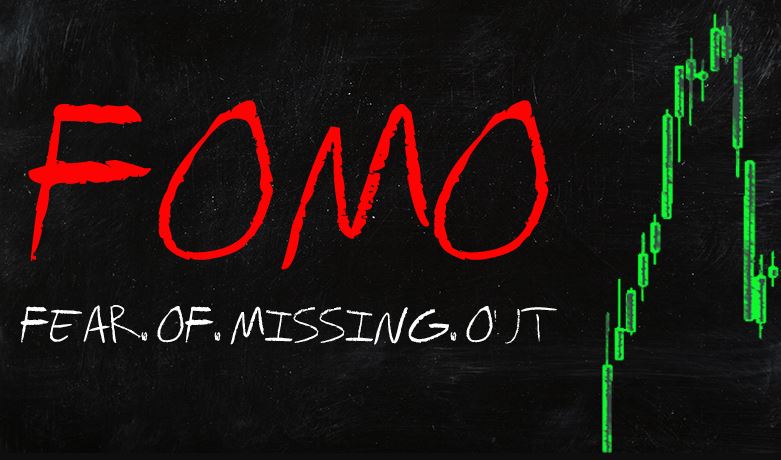
How to handle FOMO
FOMO can affect anyone but is more likely to be a problem with the younger generation, and especially amongst males. It can be all-consuming, a feeling that your peers have something better, are doing something better, or know things that you don’t.
What it all comes down to is happiness. By constantly comparing your own life to others, you become dissatisfied and this makes you unhappy. You keep checking Facebook, thinking it will help, but it makes it worse. The trick is to understand that social media is not real-life! These are edited highlights, frequently exaggerated and often the result of FOMO in other people.
Examine your own life, look at the things you are grateful for and appreciate them. Try focusing your attention on other things rather than social media. Switch off notifications. Better still, switch off your phone. If you do use social media, be constructive and arrange actual social gatherings and meet up with real people – don’t try to compete.
Most of all, remember that by following all of those fake lives on social media, what you are actually missing out on is your real life. And that would be a tragedy.
FOMO memes the funny stuff
The heading of this section is says it all so I am just going to place some random funny FOMO memes below for you to check out.
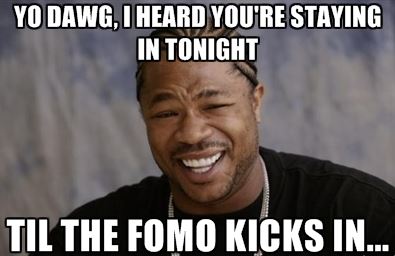
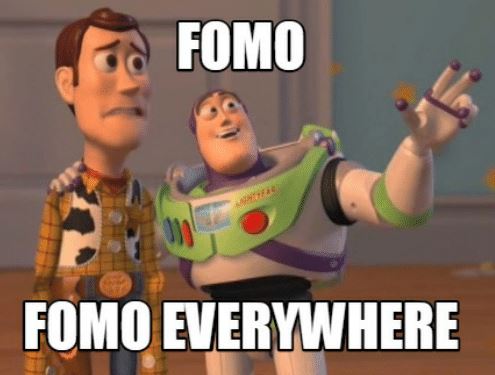
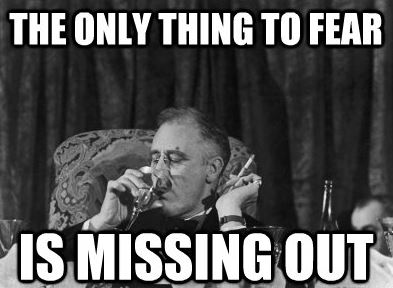
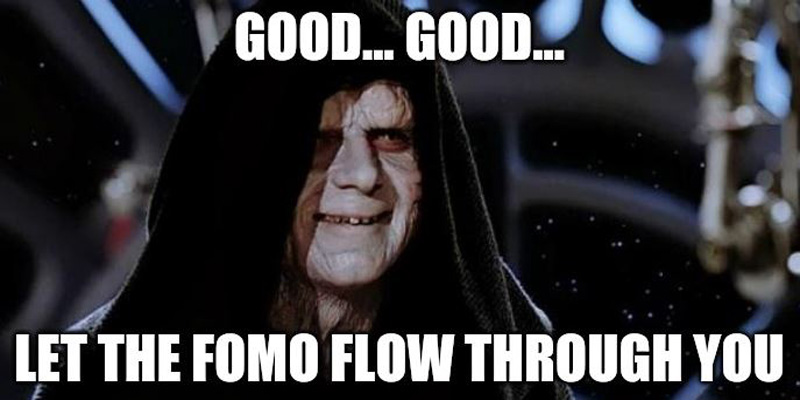
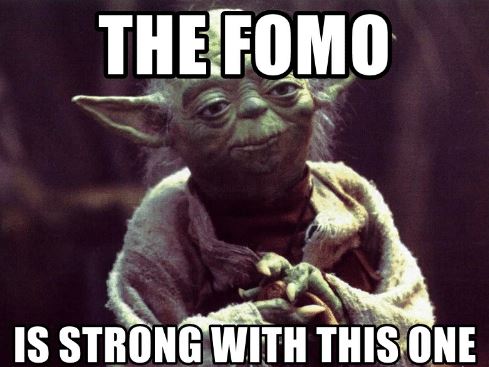
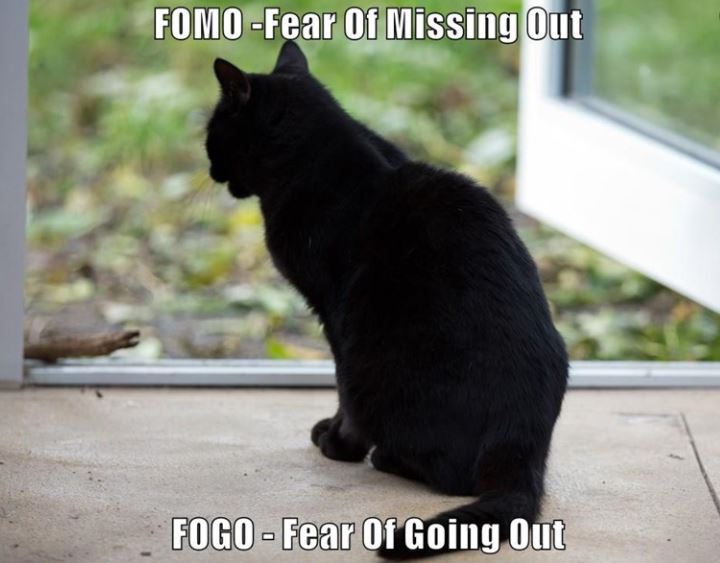
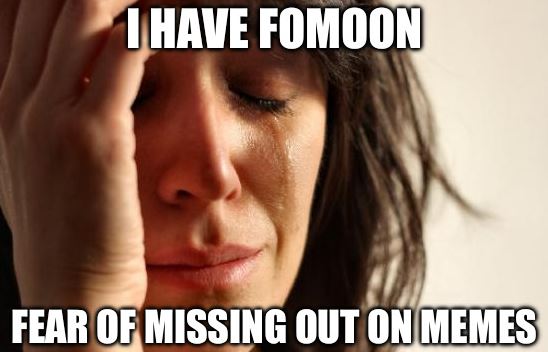
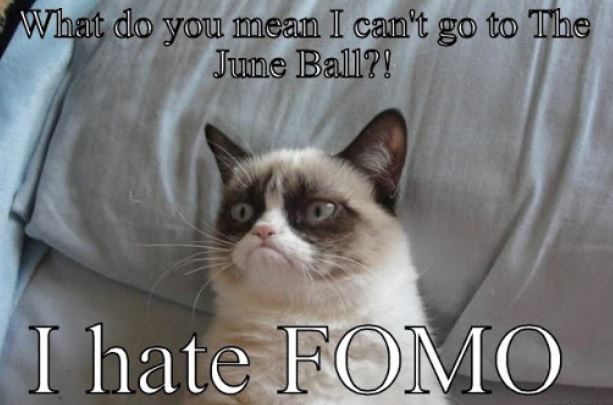
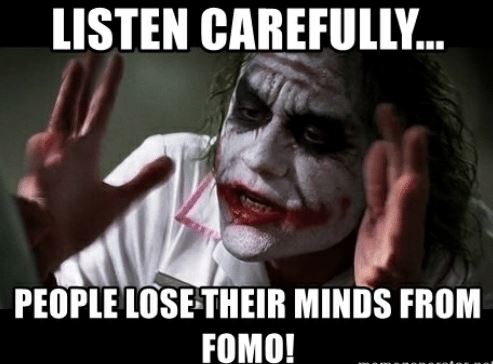




Leave a Reply